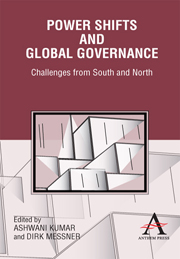Book contents
- Frontmatter
- Contents
- List of Contributors
- Foreword
- Power Shifts and Global Governance
- Part One Theoretical and Analytical Reflections on Global Governance
- Part Two Power Shifts, Regional Experiences and Global Challenges
- Part Three Case Studies in Global Governance
- 13 Unity in Diversity: South Coalitions as Governance Adaption Vehicles in Global Trade Governance
- 14 In the Foggy Middle East: Just Wars Remain the Name of the Game
- 15 Evaluation Capacity Development in the Arab Region: How Monitoring and Evaluation is Perceived and Applied?
- 16 UNEP Institutional Reform with its Impact on Developing Countries
- 17 The Heiligendamm Process and Emerging Powers: More of the Same or a Genuine Global Governance Innovation?
- Notes
17 - The Heiligendamm Process and Emerging Powers: More of the Same or a Genuine Global Governance Innovation?
from Part Three - Case Studies in Global Governance
Published online by Cambridge University Press: 05 March 2012
- Frontmatter
- Contents
- List of Contributors
- Foreword
- Power Shifts and Global Governance
- Part One Theoretical and Analytical Reflections on Global Governance
- Part Two Power Shifts, Regional Experiences and Global Challenges
- Part Three Case Studies in Global Governance
- 13 Unity in Diversity: South Coalitions as Governance Adaption Vehicles in Global Trade Governance
- 14 In the Foggy Middle East: Just Wars Remain the Name of the Game
- 15 Evaluation Capacity Development in the Arab Region: How Monitoring and Evaluation is Perceived and Applied?
- 16 UNEP Institutional Reform with its Impact on Developing Countries
- 17 The Heiligendamm Process and Emerging Powers: More of the Same or a Genuine Global Governance Innovation?
- Notes
Summary
Introduction
In recent years, the exclusive club of leading industrialized countries, the Group of 8 (G-8), has suffered from a growing legitimacy crisis due to its lack of representativeness and effectiveness (Cooper and Kelly 2007; Lesage 2007). Propelled by the economic and political rise of new powers from the global South, such as the ‘Asian drivers of global change’ (Kaplinsky and Messner 2008), the controversy over the G-8 summit architecture has gained new momentum. Present and past leaders of the West such as Britain's Tony Blair and Gordon Brown, French President Nikolas Sarkozy and Canada's former Prime Minister, Paul Martin, have called for the formal enlargement of the G-8. In her attempt to strike a balance between those in favour of inclusion and those defending the status quo, German Chancellor Angela Merkel, as host of the 2007 summit, decided to launch an innovative outreach effort towards five emerging powers. The so-called Heiligendamm process (HP) has a two-year life span and will engage Brazil, China, India, Mexico and South Africa (the G-5) in an institutionalized dialogue on four critical issue areas.
This paper examines the implications of the HP for the system of global governance and asks some critical questions: Will the ‘structured dialogue’ lead to a more inclusive summit arrangement and strengthen the position of emerging countries in the international order? Will the G-5 be able to coordinate their positions and extract concessions from industrialized countries that not only benefit themselves but also the developing world in general?
- Type
- Chapter
- Information
- Power Shifts and Global GovernanceChallenges from South and North, pp. 321 - 342Publisher: Anthem PressPrint publication year: 2010



